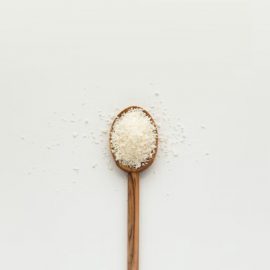

This article is an excerpt from the Shortform book guide to "Gut" by Giulia Enders. Shortform has the world's best summaries and analyses of books you should be reading.
Like this article? Sign up for a free trial here .
Is fat bad for you? Why is fat vilified? What do different types of fat do in the body?
Our culture often portrays fat as something to avoid at all costs. It’s true that eating too much fat can cause health issues, but certain types of fat play key roles in the body.
Keep reading to learn about the role of fat in the body.
Fat as a Macronutrient
Is fat bad for you?
While too much fat can be detrimental to our health, we also need certain types of fat to function. Fat primarily serves as our long-term energy supply. It’s particularly suited to this job because it can store over twice the amount of energy as proteins and carbs.
According to Enders, fat also coats our nerves. (Shortform note: The fat-based substance that coats our nerves is called myelin. Without myelin to lubricate and protect them, our nerves couldn’t properly communicate with our brain and each other, leading to problems such as muscle spasms, severe pain, and vision impairment.)
Fat and Dietary Recommendations Over Time
The perception of fat in Western society has changed over time. Dietary recommendations about fat began to appear in the 1950s when several studies found that fat consumption could increase the risk of heart disease. These studies led to an aversion to all fats that lasted through the 1980s.
In the 1990s, however, studies began to show that cutting out all fats didn’t significantly improve health. Scientists and doctors, therefore, began to push back against previous recommendations to avoid all fats.
Today, despite this shift, many people still recommend blanket low-fat diets. However, science suggests that we do need certain types of fat. For example, unsaturated fats—which are found in certain plant oils, avocados, and nuts—can improve heart health and lower blood cholesterol. Still, scientists and doctors suggest limiting our saturated and trans fat intake: Modern dietary guidelines suggest that these types of fats should compose no more than seven to 10% of our diets.
The Harvard School of Public Health has created a scale that can help you visualize which kinds of fat are good for you. At the top of the scale are healthy fats such as omega-3, omega-6, and monounsaturated fats, found in fish, nuts, and oils. Lower on the scale are saturated fats, found in red meat, butter, and ice cream. At the bottom are industrial trans fats. This category includes hydrogenated oils: synthetically produced fats that manufacturers add to food.

———End of Preview———
Like what you just read? Read the rest of the world's best book summary and analysis of Giulia Enders's "Gut" at Shortform .
Here's what you'll find in our full Gut summary :
- How your digestive system works and why it’s important to keep it healthy
- How tiny organisms in your intestines influence your immune system (and possibly your mood)
- What your appendix actually does






